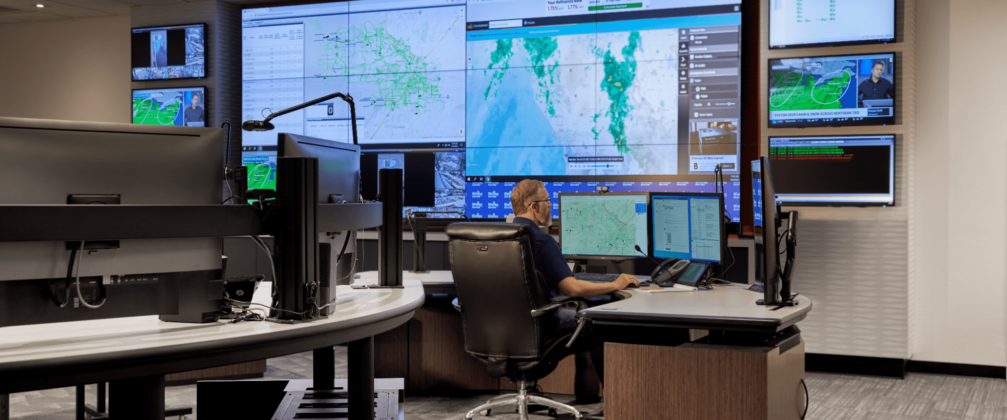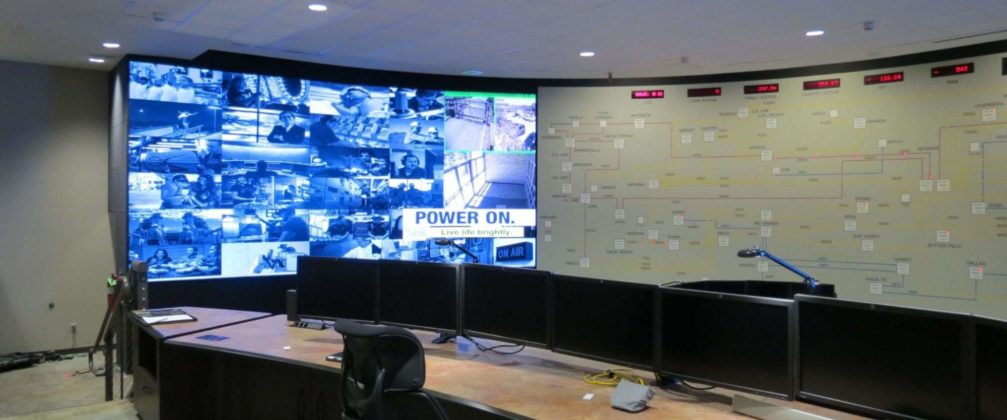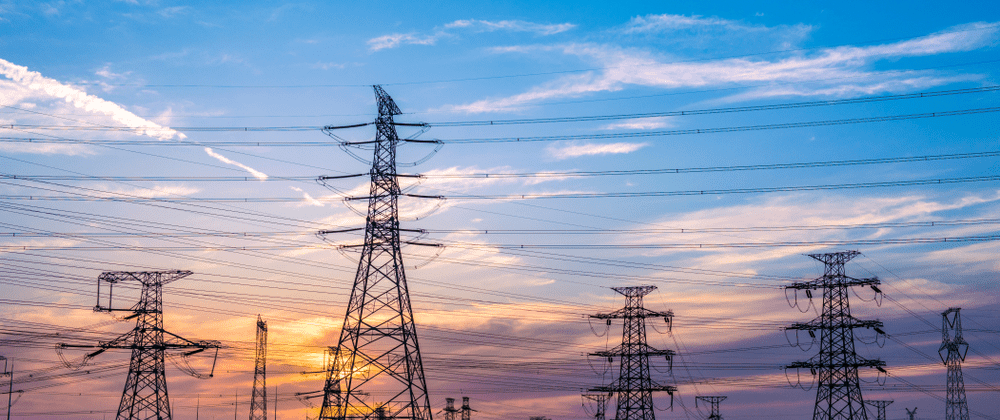If you’re in the utility industry, you probably already have a solid understanding of control room operator duties and responsibilities. But do you know about the specific qualifications and training required for transmission, distribution, or power plant operators?
Whether you’re a seasoned expert or are just getting started in the utility industry, this blog will thoroughly answer the question, “what does a control room operator do?” If you manage a utility control room, we hope this will help you hire the best talent. And if you’re an operator (or looking to become one), our goal is to prepare you for one of these exciting roles.
What is a Control Room Operator?
Control room operators work from a central command center and are responsible for controlling the production, flow, or distribution of energy from the utility to end-users (homes and businesses). In other words, they’re responsible for monitoring the daily operations to ensure that all systems and equipment are working properly.
These operators are key to the daily operation of any utility, including coal, gas, nuclear, electric, hydroelectric, water, wastewater, and solar facilities.
What Are the Most Important Control Room Operator Qualifications?
While specific control room operator qualifications vary depending on the utility facility, we’ve put together a few of the most common requirements. At a minimum, entry-level operators must possess a high school diploma. However, some senior positions may require an associate’s degree in power plant technology or a similar field.
Many utility companies also require 1-2 years of previous experience in the industry, and a background in control rooms is preferable. However, in some cases, experience performing maintenance on utility equipment (e.g. generators, electrical auxiliaries, transmission networks, distribution systems, etc.) is enough to qualify for an entry-level operator role.
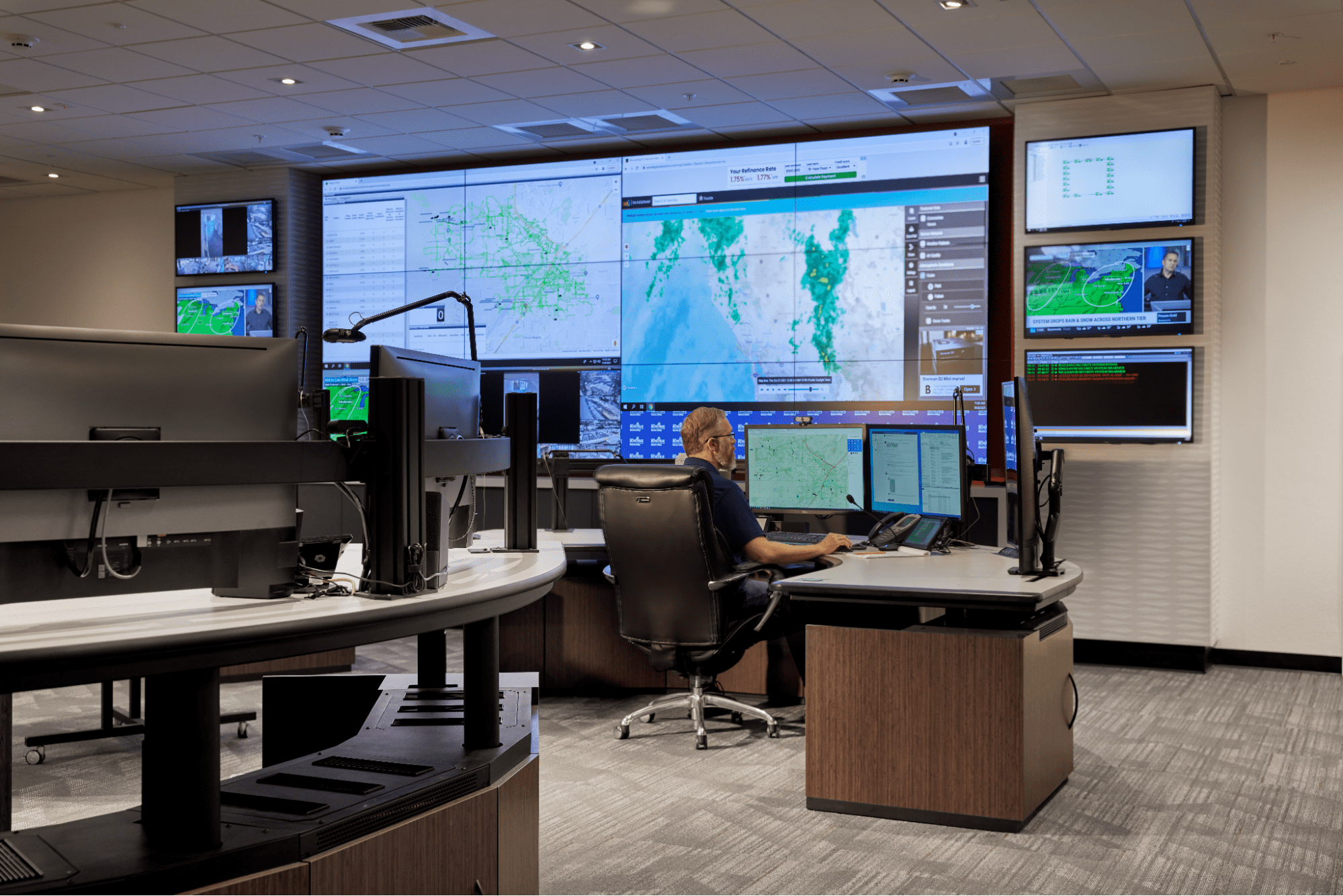
Essential Soft Job Skills for Utility Operators
Operators should possess the following soft job skills, which are how you interact with coworkers and handle your workload:
- Flexibility and adaptability, especially in high-stress situations
- Ability to work under pressure
- Strong written and verbal communication skills
- Ability to analyze data, consider potential consequences, and take action
- Innovative problem-solving skills
- Ability to work independently and as part of a team
Essential Hard Job Skills for Utility Operators
Control room operator qualifications include the following hard job skills, which are measurable and teachable abilities:
- Ability to operate switches, valves, control devices, etc.
- Detailed understanding of how each control affects overall operations
- Deep knowledge of how generating units or transmission networks operate, their engineering, and best practices for maintenance
- Thorough understanding of job safety requirements and the ability to follow them every day
- Mechanical skills and experience with facility equipment maintenance (preferable)
- OSHA 29 CFR 1910.120 certification (preferable)
- Ability to interpret schematic diagrams, technical manuals, and blueprints (preferable)
What Are Control Room Operator Duties & Responsibilities?
Are you still asking yourself, “what does a control room operator do?” Like control room operator qualifications, the duties and responsibilities of command center personnel vary greatly based on the facility.
However, we’ve put together lists of the most common control room operator duties and responsibilities to give you an overview of these roles. We’ve also broken them down by category to help you pinpoint specific tasks.
On-Facility Operations
- Operate, control, and maintain all power-generating or carrying equipment, including (but not limited to) generators, turbines, boilers, transmission networks, or distribution lines.
- Monitor equipment statuses using all tools available in the control room and on-site and record them in applicable journals and/or daily logs
- Maintain facility security, respond to all emergencies, and direct command and support staff to the locations of emergencies
- Prepare, maintain, and execute procedures related to the operation, monitoring, and maintenance
- Monitor equipment for maximum efficiency and output while maintaining safety standards and environmental compliance
Communication
- Fully brief incoming unit relief operator at shift changes to ensure continuity
- Recommend ways to improve overall facility performance, efficiency, output, and reliability
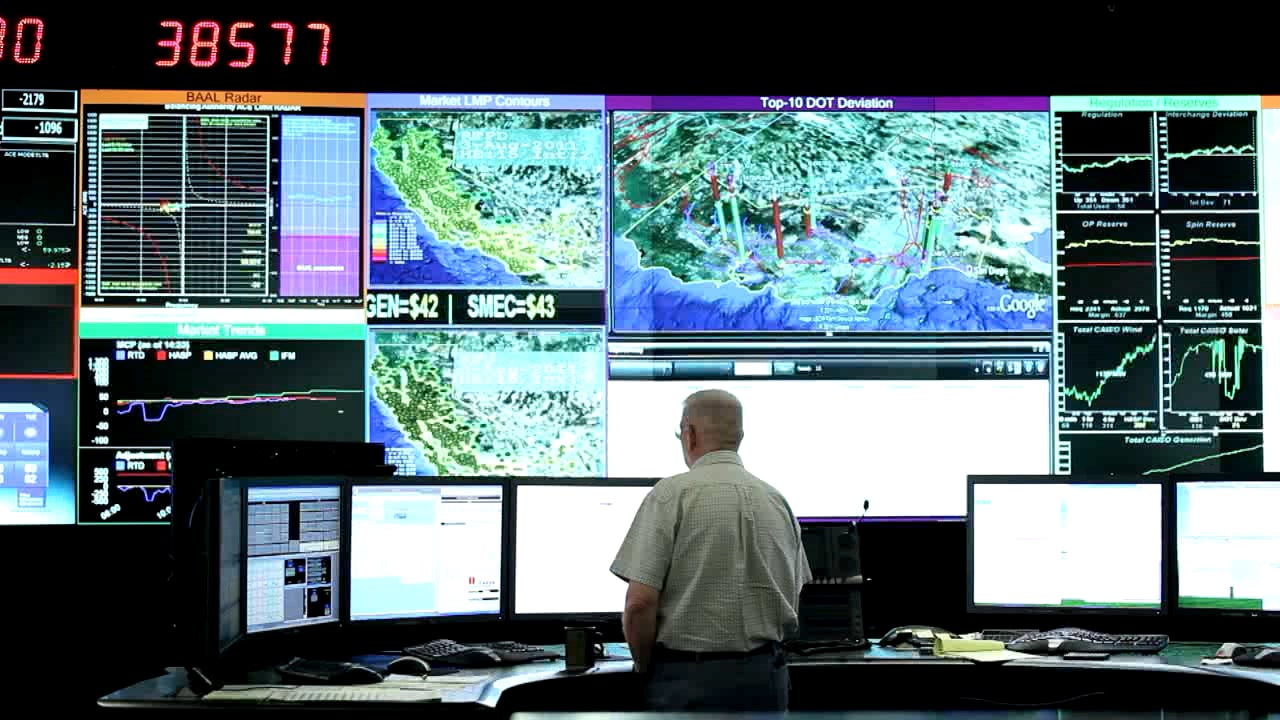
Maintenance
- Troubleshoot equipment when anomalies are detected to minimize safety risks and financial expenses
- Pinpoint equipment problems, report abnormal conditions to management and prepare detailed maintenance requests
- Ensure facility safety and cleanliness are maintained and ensure that operators carry out scheduled checks
Quality Assurance
- Support and participate in the implementation and evolution of the operations quality management system
- Prepare and support all quality assurance procedures and technical processes
Technical Knowledge
- Detect and communicate distributed control system (DCS) issues to the right personnel
- Understand and implement information from manufacturer and technical manuals, piping and instrumentation diagrams (P&IDs), and operating and maintenance documents
- Interpret and enforce complicated technical information, such as manufacturer data, electrical drawings, and operating and maintenance processes
Supervisory Control & Data Acquisition (SCADA)
- Use SCADA to gather and analyze outage data in real-time and begin restoring power
- Prioritize the importance of outages and communicate them to the appropriate personnel
- Manage and communicate SCADA alarms using various verbal and electronic media
Testing & Outage Management
- Support engineers by regularly performing and analyzing tests and creating outage packages
- Assist in planning, organizing, and executing unit outages in preparation for inspections, overhauls, repairs, and cleaning
- Perform disconnect switching and electrical and maintenance functions to place equipment in and out of service
How to Become a Control Room Operator
There are three main ways that you can learn the skills necessary to become an operator, which we’ll examine in more detail below.
1. On-the-Job Learning
Some utility companies choose to train operators on the job to ensure that they learn the skills and procedures that are unique to their facility. These utilities may feel that daily interactions between personnel, equipment, management, and processes are more effective than formal education.
New employees who learn on the job often internalize tasks through first-hand experience. Human error is one of the main causes of utility safety incidents, but repeated on-the-job practice can reduce the likelihood of operator faults and boost overall productivity.
2. Formal Education
Formal education (such as an associate’s degree) is often required for employees in highly-technical or senior positions. Utilities that directly impact public health (like water or wastewater facilities) may require additional formal education. And high-risk facilities (like nuclear power plants) often require operators to possess an associate’s or bachelor’s degree.
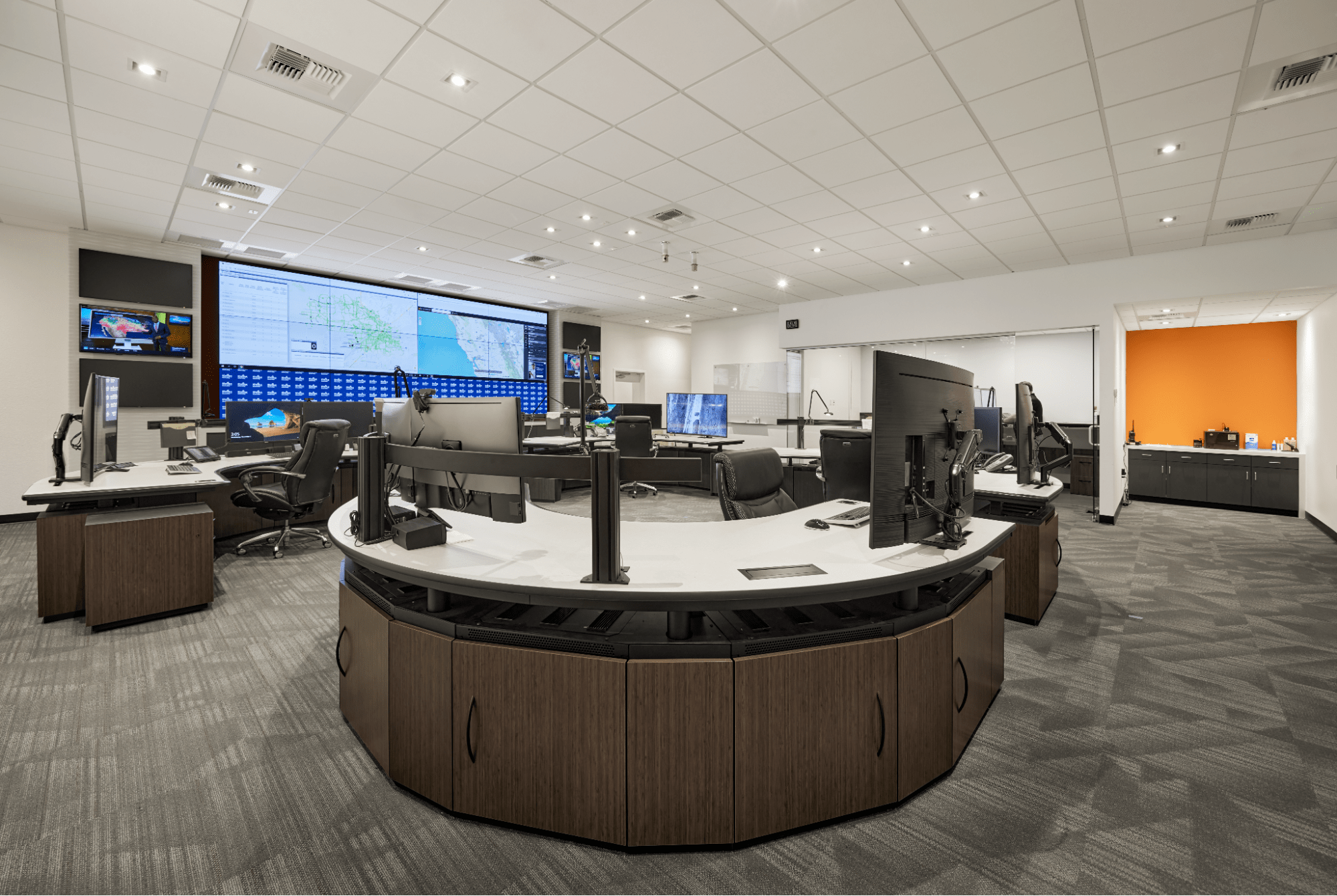
3. Continuing Education
Whether you learn on the job or have completed some level of formal education, ongoing training and professional development are key to being an effective operator. This can take the form of in-person trainings, shadowing senior operators, certified online courses, and more.
New utility technologies and control systems are being introduced continuously, along with stricter monitoring and compliance rules. As a result, control room operators must be thoroughly trained to avoid environmental damage, costly shutdowns, and risk to human health and safety.
What is Control Room Operations Training?
No control room operator description would be complete without an in-depth exploration of training processes. As we mentioned above, continuing education and certifications ensure that operators possess the skills and knowledge required to perform essential job functions.
Control room operations training enhances operator response times and critical thinking skills, which are crucial in emergency situations. Additionally, it ensures that your personnel satisfy industry, compliance, and regulatory standards, along with providing a standardized approach to completing everyday tasks.
Utility operations control large, complicated systems that are constantly evolving, and they must be prepared to meet these challenges. Inadequate training can lead to flawed inspections, misidentification of hazards, and obstructed operating procedures. It can also have disastrous, far-reaching environmental and public health consequences that may be impossible to mitigate.
While control room operations training varies, most programs contain three main areas: command center operations, emergency response procedures, and overall facility operations. We’ll review the details of each training program in the following sections.
1. Control Room Operations
- Ability to maintain a state of readiness, which involves controlling emergency and critical situations with a particular focus on operator hazards and managing stress
- In-depth understanding of remote operations and integrated systems
- Knowledge of control processes and the ability to prepare equipment for normal operation and maintenance
2. Emergency Response Procedures
- Emergency operations readiness and ability to diagnose electrostatic discharge (ESD) complications
- Knowledge of standard emergency response role and responsibilities
- Ability to operate emergency shutdown, blow-down, fire, and gas detection systems
- Alarm management, interpretation, and response
3. Overall Facility Operations
- Complete awareness of system layouts, including control room design and isolation and treatment of various emergency systems
- In-depth understanding of system interfaces and how to operate each one
- Knowledge of face-to-face handover procedures and efficient operational procedures
- Understanding of different control room layouts and the importance of ergonomics
- Ability to complete administrative tasks, like incident logging and checklists
